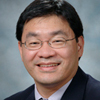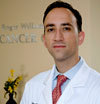Editor-in-Chief Steven K. Libutti, MD, FACS, Steven K. Libutti, MD, FACS,
Director and Vice Chancellor for Cancer Programs
Rutgers Cancer Institute of New Jersey
Rutgers, The State University of New Jersey
Dr. Libutti received his A.B. from Harvard College and his M.D. from the College of Physicians and Surgeons of Columbia University, where he was inducted into the Alpha Omega Alpha medical honor society. He completed his internship and surgical residency and was chief resident at the Presbyterian Hospital in New York. Following his residency, he was a fellow in surgical oncology and endocrine surgery at the National Cancer Institute (NCI) and became a senior investigator and chief of the Tumor Angiogenesis Section in the Surgery Branch at the NCI.
Dr. Libutti has received numerous honors and awards, including the NCI Director's Gold Star Award, the NCI Director's Intramural Innovation Award and the NIH Director's Award. Dr. Libutti has been voted a "Top Doctor in America" and was named to New York magazine's list of the "Top Doctors in New York." In 2009, Dr. Libutti was invested as the Marvin L. Gliedman, M.D., Distinguished Surgeon at Montefiore Medical Center. He has published more than 250 peer-reviewed journal articles and 16 book chapters, has given numerous presentations and lectures and holds six U.S. patents.
His responsibilities include directing multidisciplinary cancer care, surgical oncology and clinical cancer research. He directs an NCI funded laboratory focused on the tumor microenvironment. Dr. Libutti's primary interests are in endocrine and neuroendocrine tumors involving the thyroid, parathyroid, adrenal glands and the pancreas. He is also a leader in regional cancer therapy and tumor-targeted gene therapy.
Advisory Editors David L. Bartlett, MD, Chief of the Division of Surgical Oncology, UPMC Cancer Center, Pittsburgh, PA David L. Bartlett, MD, Chief of the Division of Surgical Oncology, UPMC Cancer Center, Pittsburgh, PA
Dr. Bartlett specializes in regional therapeutics - the delivery of chemotherapy or biological therapeutic agents directly to the blood vessels leading to a tumor. Prior to joining University of Pittsburgh Cancer Institute (UPCI), Dr. Bartlett was a senior investigator in the surgery branch at the Center for Cancer Research at the National Cancer Institute where he performed isolated limb perfusion for the treatment of melanoma and developed innovative surgical techniques to deliver cancer treatment that resulted in improved survival and quality of life for patients with abdominal and liver cancers. In addition to his work on regional therapeutics, Dr. Bartlett is investigating tumor directed gene therapy for cancer. He is currently working with the vaccinia virus (smallpox vaccine virus), using it as a vector to deliver gene therapy directly to tumor sites, and genetically engineering the virus to kill cancer cells. Dr. Bartlett received his medical degree from the University of Texas Medical School at Houston and completed his surgical training at the Hospital of the University of Pennsylvania in Philadelphia. He also completed a fellowship in surgical oncology at Memorial Sloan-Kettering Cancer Center in New York. Among his accomplishments, Dr. Bartlett has authored numerous articles on regional treatment strategies and tumor directed gene therapy in peer-reviewed journals such as Cancer Research and the Journal of the National Cancer Institute. He has also authored several chapters in textbooks on cancer therapeutics and surgical oncology.
 David T. Curiel, M.D., Ph.D. David T. Curiel, M.D., Ph.D.
Dr Curiel is the Director of the Cancer Biology Division of the Department of Radiation Oncology at Washington University School of Medicine. He graduated medical school at Emory University in 1982, where he also completed his internship and residency in Internal Medicine. Dr. Curiel's scientific training includes tenureship at the National Institutes of Health in Bethesda, Maryland at the Pulmonary Branch of the Heart and Lung, and Blood Institute (NHLBI) from 1985-1989, and a fellowship in Biotechnology at the National Cancer Institute, Navy Medical Oncology Branch from 1989-1990. He received his Ph.D. from University of Groningen in The Netherlands in 2002. Dr. Curiel has been at Washington University School of Medicine since 2011. In addition to his role as Director of the Cancer Biology Division, he is Director of the Biologic Therapeutics Center.
 Patrick Hwu, M.D., The University of Texas MD Anderson Cancer Center, Houston, TX Patrick Hwu, M.D., The University of Texas MD Anderson Cancer Center, Houston, TX
Dr Hwu is considered one of the leading tumor immunologists in the country, and a primary force in the development of novel vaccine and adoptive T-cell therapies. His laboratory and clinical work have led to insights and advances in the understanding of the interactions between tumors and the immune system, and the development of cellular immunotherapies. He was recruited to be the first Chairman of the Department of Melanoma Medical Oncology in 2003. Since that time, he has also served as Associate Director of the Center for Cancer Immunology Research and is the current Chair of MD Anderson Cancer Center's Promotion and Tenure Committee. His laboratory is significantly funded by the National Cancer Institutes. He is the principal investigator on three RO1 translational immunotherapy grants, as well as a P01 comprehensive program grant that is investigating the use of plasmacytoid dendritic cells to enhance immunotherapy. Dr. Hwu is a member of the editorial board of the Journal of Immunotherapy. He is a frequently requested national and international lecturer. He has published more than 90 peer-reviewed articles. Dr. Hwu is the recipient of numerous awards such as the George and Barbara Bush Endowment for Innovative Cancer Research in 2004, the Robert R. Herring Professorship in Clinical Research 2004 - 2007, the Moshe Talpaz Endowed Chair in Immunology from 2007 to present, and the Division of Cancer Medicine Hematology/Oncology Fellowship Program Mentor of the Year for FY2009, just to name a few.
 Steven Katz, M.D., FACS, Director, Complex Surgical Oncology Fellowship, Roger Williams Medical Center, RI; Associate Professor of Surgery, Boston University Medical Center Steven Katz, M.D., FACS, Director, Complex Surgical Oncology Fellowship, Roger Williams Medical Center, RI; Associate Professor of Surgery, Boston University Medical Center
Dr. Katz received his B.A. Wesleyan University and his M.D. from New York University School of Medicine, receiving the Alpha Omega Alpha Award for graduating with the top academic average in his class. He completed his general surgery residency at the New York University Medical Center, where he served as the Chief Administrative Resident. During his residency, Dr. Katz completed a Research Fellowship in liver immunology at the Memorial Sloan-Kettering Cancer Center (MSKCC). After completion of his general surgery training, Dr. Katz returned to MSKCC for a clinical Surgical Oncology Fellowship and served as the Chief Administrative Fellow.
Following completion of his training, Dr. Katz joined the Roger Williams Medical Center (RWMC) in Providence, Rhode Island. He is currently the Director of the RWMC Office of Therapeutic Development and Director of the Complex General Surgical Oncology Fellowship. His clinical expertise is in liver surgery, pancreatic surgery, sarcoma, and melanoma. Dr. Katz focuses his research endeavors on immunotherapy for liver metastases and sarcoma, with an emphasis on overcoming immunosuppression in solid tumors. He has served as principal investigator for novel phase I/Ib immunotherapy trials, testing regional CAR-T therapies for liver metastases. The Hepatic Immunotherapy for Metastases (HITM, NCT01373047) and HITM-SIR (NCT02416466) trials for liver metastases have attracted patients from across the country and globe. He has also invented a novel CAR-T product for gastrointestinal stromal tumor. Dr. Katz has received research grants from numerous societies, including the Society of Surgical Oncology, Sarcoma Foundation of America, Rhode Island Foundation, and National Organization for Rare Disorders. Work in his laboratory is also been funded by NIH grants. He is a member of numerous professional societies, is a reviewer for numerous scientific and clinical journals, and serves on the editorial boards for the Journal of Surgical Research, the Annals of Surgical Oncology, and Cancer Gene Therapy.
 Paula Lam Yeng Po, PhD, Department of Physiology, National University of Singapore Paula Lam Yeng Po, PhD, Department of Physiology, National University of Singapore
Paula Lam is currently an adjunct associate professor at National University of Singapore, Department of Physiology. She is also the head of RnD at Stem Med Pte. Ltd., Singapore. Dr Lam completed her postdoctoral trainings at St. Jude Childrens' Research Hospital, and Harvard Medical School. Her research focuses on the development of novel and effective gene delivery systems targeted against solid cancers.
 Edmund C. Lattime, PhD, Rutgers Cancer Institute of New Jersey, New Brunswick, NJ Edmund C. Lattime, PhD, Rutgers Cancer Institute of New Jersey, New Brunswick, NJ
Dr. Lattime is the deputy director at the Rutgers Cancer Institute of New Jersey, as well as the associate director for education and training. He also is a professor of surgery and professor of biochemistry and molecular biology at the Rutgers Robert Wood Johnson Medical School. Dr. Lattime is well known for his work in tumor immunology. His laboratory studies the interaction between the tumor and immune response with the ultimate goal of developing effective immunotherapeutic approaches.
 Michael T. Lotze, M.D., University of Pittsburgh, University of Pittsburgh Cancer Institute, Pittsburgh, PA Michael T. Lotze, M.D., University of Pittsburgh, University of Pittsburgh Cancer Institute, Pittsburgh, PA
Dr. Lotze is a Professor of Surgery, Immunology, and Bioengineering; Vice Chair of Research within the Department of Surgery; Asst. Vice Chancellor in the six schools of the Health Sciences at Pitt; and Co-Director of Cytometry within the University of Pittsburgh Cancer Institute. He has worked in the field of Immunology and clinical medicine for over 35 years and believes that a fundamental understanding of cancer biology and immunology is essential to making progress in Oncology. He launched the field of modern gene therapy along with Michael Blaese and Steven Rosenberg at the NCI with the first gene therapies in man and was one of the founding directors of the Alliance for Cancer Cell and Gene Therapy (ACGT). He received his M.D./B.Med.Sci. from Northwestern University within the Honors Program in Medical Education. He has over 500 publications in peer reviewed journals and have edited several texts including three editions of Current Cancer Therapy [with John Kirkwood], the Surgical Treatment of Advanced Cancer [with Joshua Rubin], and Cellular Immunology and the Immunotherapy of Cancer [with Olivera J. Finn. He developed and edited the 4th Edition of the Cytokine Handbook [2003], the 1st edition of Measuring Immunity [2004], the 2nd edition of Dendritic Cells [2002], and the 1st Edition of NK Cells [2009] with Dr. Angus Thomson. His research focuses on the role of necrotic cell death and how it modifies immunity and the biology of inflammation and cancer as wells as cellular and gene-based immunotherapy using cytokines, NK cells, and DCs. His academic career included surgical training at the University of Rochester as well as fellowships at the M.D. Anderson Institute and the National Cancer Institute. He was Senior Investigator in the Surgery Branch of the NCI from 1982-1990 and founding director and Chief of the Division of Surgical Oncology from 1990-2000 as well as its training program in an SSO approved surgical oncology program. Until 2001 he served as Vice-President for Discovery Research in Inflammation and Oncology at SmithKline Beecham and Vice President of High Throughput Biology within Discovery Research in GlaxoSmithKline.
 J. Andrea McCart, M.D., MSc, FRCSC, Department of Surgery, University of Toronto; Mount Sinai Hospital; and Toronto General Research Institute, Toronto, Canada J. Andrea McCart, M.D., MSc, FRCSC, Department of Surgery, University of Toronto; Mount Sinai Hospital; and Toronto General Research Institute, Toronto, Canada
Dr. McCart completed medical school and General Surgery training at the University of Western Ontario. During residency she undertook research studying p53 mutations in esophageal cancer and obtained her MSc in Pathology in 1995. Following residency she completed a surgical oncology fellowship focused on regional therapies of cancer at the National Cancer Institute in Bethesda Maryland. While there she also did post-doctoral research investigating gene and viral therapies for cancer. Dr. McCart moved to Toronto in 2001, where she is currently an Associate Professor in the Department of Surgery, a Surgeon at Mount Sinai Hosptial, and a Scientist at the Toronto General Research Institute. Her clinical interests include treatment of peritoneal malignancies and gastrointestinal surgical oncology. Her research laboratory is developing novel viral-based therapeutics for peritoneal and other malignancies.
 Venu G. Pillarisetty, M.D., Hepatopancreatobiliary Surgical Oncology, University of Washington, Seattle, WA Venu G. Pillarisetty, M.D., Hepatopancreatobiliary Surgical Oncology, University of Washington, Seattle, WA
Dr. Pillarisetty received his B.S. from the University of Michigan and his M.D. from Columbia University College of Physicians and Surgeons. He completed his general surgery residency at the University of Massachusetts, during which he also completed a three-year research fellowship studying liver immunology at Memorial Sloan-Kettering Cancer Center (MSKCC). Upon completing general surgery residency, he returned to MSKCC as a General Surgical Oncology clinical fellow.
Since graduating from fellowship in 2009, Dr. Pillarisetty has been a faculty member at the University of Washington in Seattle, and is currently an Associate Professor in the Hepatopancreatobiliary Surgical Oncology section. He has a federally-funded basic science research laboratory focused on the study of role of the tumor microenvironment of gastrointestinal malignancies on shaping adaptive immune function and resistance. His laboratory is actively testing novel methods to reactivate anti-tumor immunity in human tumors. He also has a high-volume pancreatic surgery practice and serves as the Medical Director of Continuous Performance Improvement at the Seattle Cancer Care Alliance.  Kenneth Tanabe, MD, Division of Surgical Oncology, Massachusetts General Hospital, Boston, MA Kenneth Tanabe, MD, Division of Surgical Oncology, Massachusetts General Hospital, Boston, MA
Dr. Tanabe is a Professor of Surgery at Harvard Medical School and Chief of the Division of Surgical Oncology at Massachusetts General Hospital. He is the Deputy Clinical Director of the Massachusetts General Hospital Cancer Center and Director of the MGH Liver Surgery Program. Dr. Tanabe's clinical practices focuses on surgical management of patients with liver tumors and patients with melanoma. One focus in his laboratory group centers on viral oncolytic therapy, and he serves as Principal Investigator for gene therapy clinical trials. The other focus in his laboratory is on chemoprevention of liver cancer, and he serves as Principal Investigator for chemoprevention clinical trials.
 Herbert J. Zeh III, M.D. Herbert J. Zeh III, M.D.
Dr Zeh is Chair of the Department of Surgery at UT Southwestern Medical Center and the Hall and Mary Lucile Shannon Distinguished Chair in Surgery. A practicing surgeon for more than 20 years, Dr. Zeh is an internationally recognized leader in the field of translational research for Gi malignancies, focusing on pancreatic cancer. Dr. Zeh earned his medical degree at the University of Pittsburgh School of Medicine. He completed his surgical residency and fellowship training in advanced gastrointestinal surgery and surgical oncology at The Johns Hopkins Hospital in Baltimore. Prior to joining UT Southwestern in 2018, Dr. Zeh served as the Watson Family Professor of Surgery at the University of Pittsburgh School of Medicine, chief of the Division of Gastrointestinal (GI) Surgical Oncology at the UPMC Hillman Cancer Center, co-director of the UPMC Pancreatic Cancer Center.. Dr. Zeh supervises a translational research lab focused on damage associated molecular pattern molecules (DAMPs), their role in cancer immuno-biology, and clinical approaches to targeting this pathway. Dr. Zeh has published six investigator initiated clinical research trials examining new regimens for the treatment of GI malignancies He is PI on and R01 examining autophagy inhibition in pancreatic cancer. The author of over 250 peer-reviewed manuscrits Dr. Zeh is a member of professional organizations including the American Surgical Association, the American College of Surgeons, the American Society of Clinical Oncology, the Association of Academic Surgeons, the Society of Clinical Surgery, the Society of Surgical Oncology, and the Society of University Surgeons.
Regional Associate EditorsAsia/Far East
Toshiyoshi Fujiwara, Japan
Yong-Song Guan, China
Masa Tagawa, Japan
Chae-Ok Yun, Korea
Europe
Farzin Farzaneh, UK
North & South America
C Estuardo Aguilar-Cordova, US
Michael M Gottesman, US
Daolin Tang, US Editors EmeritusRobert E Sobol, US
Kevin J Scanlon, US
|

 Steven K. Libutti, MD, FACS,
Steven K. Libutti, MD, FACS, David L. Bartlett, MD, Chief of the Division of Surgical Oncology, UPMC Cancer Center, Pittsburgh, PA
David L. Bartlett, MD, Chief of the Division of Surgical Oncology, UPMC Cancer Center, Pittsburgh, PA David T. Curiel, M.D., Ph.D
David T. Curiel, M.D., Ph.D Patrick Hwu, M.D., The University of Texas MD Anderson Cancer Center, Houston, TX
Patrick Hwu, M.D., The University of Texas MD Anderson Cancer Center, Houston, TX Steven Katz, M.D., FACS, Director, Complex Surgical Oncology Fellowship, Roger Williams Medical Center, RI; Associate Professor of Surgery, Boston University Medical Center
Steven Katz, M.D., FACS, Director, Complex Surgical Oncology Fellowship, Roger Williams Medical Center, RI; Associate Professor of Surgery, Boston University Medical Center Paula Lam Yeng Po, PhD, Department of Physiology, National University of Singapore
Paula Lam Yeng Po, PhD, Department of Physiology, National University of Singapore Edmund C. Lattime, PhD, Rutgers Cancer Institute of New Jersey, New Brunswick, NJ
Edmund C. Lattime, PhD, Rutgers Cancer Institute of New Jersey, New Brunswick, NJ Michael T. Lotze, M.D., University of Pittsburgh, University of Pittsburgh Cancer Institute, Pittsburgh, PA
Michael T. Lotze, M.D., University of Pittsburgh, University of Pittsburgh Cancer Institute, Pittsburgh, PA J. Andrea McCart, M.D., MSc, FRCSC, Department of Surgery, University of Toronto; Mount Sinai Hospital; and Toronto General Research Institute, Toronto, Canada
J. Andrea McCart, M.D., MSc, FRCSC, Department of Surgery, University of Toronto; Mount Sinai Hospital; and Toronto General Research Institute, Toronto, Canada Venu G. Pillarisetty, M.D., Hepatopancreatobiliary Surgical Oncology, University of Washington, Seattle, WA
Venu G. Pillarisetty, M.D., Hepatopancreatobiliary Surgical Oncology, University of Washington, Seattle, WA Kenneth Tanabe, MD, Division of Surgical Oncology, Massachusetts General Hospital, Boston, MA
Kenneth Tanabe, MD, Division of Surgical Oncology, Massachusetts General Hospital, Boston, MA Herbert J. Zeh III, M.D.
Herbert J. Zeh III, M.D.



 京公网安备 11010802027423号
京公网安备 11010802027423号